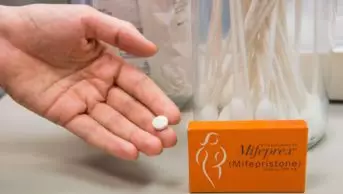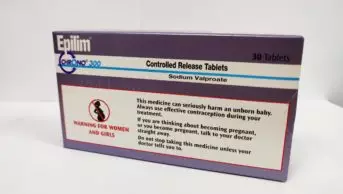
LEA PATERSON / SCIENCE PHOTO LIBRARY
The line on hormone replacement therapy (HRT) being fed to pharmacists has remained roughly the same since shortages began in late 2018: there are ongoing shortages owing to a range of issues, but alternatives are available and officials are working to keep NHS staff informed and maintain overall supplies.
Speak to pharmacists and their patients, however, and a different picture emerges. There is immense frustration at the rationing and missed medication from women scouring local pharmacies on the hunt for patches, and huge amounts of extra work and inconvenience for all involved.
Kerry Barrett, an author who lives in London, says that around a year ago she took her usual Elleste Duet (estradiol hemihydrate and norethisterone acetate; Mylan) prescription to her pharmacy, only to be told they neither had it nor could they order it in. She eventually got some at the third pharmacy she tried, but, six months later, her GP told her that the product could not be obtained anywhere.
I think the most frustrating thing is that it doesn’t seem to be taken seriously
Like many other women, Barrett tried an alternative HRT product, which she took for a couple of months, but almost immediately found her symptoms, including night sweats, insomnia, anxiety and mood swings had returned.
In desperation, she started looking for HRT products at online pharmacies, where she found a three-month supply for almost four times the list price. It was a price she was willing to pay, although she worries about what will happen to those who cannot afford to do the same.
“I think the most frustrating thing is that it doesn’t seem to be taken seriously. I had an early menopause so without my HRT I’m at increased risk of heart disease and osteoporosis. But aside from that, it’s been so debilitating and I struggle to function without the HRT,” she says.
Ongoing problems
Pharmacists say this is far from a one-off. They report dealing with many daily cases of women who cannot get HRT or are struggling to find the right alternative.
Amanda Smith, pharmacy manager at Heath Pharmacy in Halifax, West Yorkshire, says there have been times when the pharmacy was barely managing to fulfil any prescriptions and, on other occasions, they have had to order stock directly from manufacturers with proof of outstanding prescription.
“There have been intermittent deliveries to wholesalers and, if you’re quick, you can place an order, but we have to check constantly throughout the day on the wholesalers websites for the stock to appear and it can all be gone again within an hour, so it’s really down to luck,” she says.
Prescribers are calling up to request alternatives, which can be very time consuming as they often have to check around three or four wholesalers, she explains. At the same time, patients are calling “from far and wide” to see if they have any stock, adding to the workload.
These women are frustrated and they really need support
Nuttan Tanna is a pharmacist consultant specialising in women’s health at North West London Hospitals NHS Trust. She works in a specialist clinic for women experiencing menopause who get repeat prescriptions for HRT via their GP and says that many of the women she has treated have had major problems getting their HRT supplied: “The problem is then you get people trying to make their medicine last longer by using half doses, which is no good, or they have given up completely”.
She adds: “These women are frustrated and they really need support. And the thing is the patient should not be struggling with this. But they are all saying how hard their community pharmacist is trying to help them.”
Much of the frustration among pharmacists, GPs and patients comes down to a lack of information about why they are having to deal with this. There has been no explanation or guidance that accounts for why the UK is having such a significant problem with HRT when other countries do not.
Contributing factors
We really have not got to the bottom of why we have this problem
Although the official line is that Brexit and medicines shortages are unrelated, it is often put forward as a contributing factor instead. In October 2019, HRT was banned from parallel exporting — a process where companies buy medicines meant for UK patients and sell them on at a higher price in another country — by the Department of Health and Social Care. The government insisted the move, announced at the same time as the first serious shortage protocols, had nothing to do with Brexit.
The British Menopause Society (BMS) has been working closely with the Royal Society of Obstetricians and Gynaecologists (RCOG) to provide any advice and information it can about managing the shortages, and is not shy about sharing its frustration.
“We really have not got to the bottom of why we have this problem,” says Haitham Hamoda, chair of the BMS. “‘Manufacturing and supply problems’ is a very vague term, but that is as much as we know. When you use vague terminology, that is when people start speculating.”
He stresses that alternatives are available and says it is frustrating to hear of women going abroad for HRT as that shouldn’t need to happen. He is “cautiously optimistic” that, should stocks start to come back in from Spring 2020, as is being advised, there will be improvement over the course of the year.
The BMS and the RCOG wrote to Matt Hancock, the health and social care secretary, in early February 2020, requesting that they form part of a working group with government, industry and regulatory agencies to establish the cause of HRT shortages and ensure that they are not repeated.
The government gave a non-committal response. And in a written parliamentary answer, published five days after the government received the letter, the health minister Jo Churchill said: “We have been working closely with all suppliers of HRT preparations to maintain overall supply to patients, and we anticipate the supply situation will improve from the end of this month”.
The government says that although it shares information it holds on HRT shortages with the NHS, it will not make this information public.
Most patients are really frustrated and fed up, some are going without meds, and it has affected their day to day quality of life
Robin Conibere, a GP pharmacist based at the Beacon Medical Group in Devon, has little faith that stocks will return to normal levels in March 2020 given what has happened to date. He says every day he takes two or three calls about HRT — a topic which he has had to train himself up on very quickly.
“Because there is so much individual variation, people are happy with what they’re on and if you start having to experiment it’s not going to be easy. Most patients are really frustrated and fed up, some are going without meds, and it has affected their day to day quality of life,” he says.
He has been trying to keep on top of what is available by checking BMS guidance, taking extra steps to check wholesaler supplies and being in contact with a local group that uses the Telegram app (where pharmacies list what stock they might hold). But stocks change all the time, he says. “We’re going round in circles — we have got good relationships with our community pharmacies, but it’s really difficult.”
Conibere adds that prescribers are essentially left generating paper prescriptions and telling patients that they will have to shop around. Yet patients still come back empty-handed asking “what now?”.
Tom Gregory, a GP practice pharmacist and independent prescriber in North Somerset, said he did, at one point, spend some time trying to track shortages and get ahead of what was happening, but this proved to be too much work.
“I can’t work out what the reason is, and there do seem to have been ripple effects when one is out of stock, but you can’t pin down where it’s happening. They seem to come back in then go out of stock again. I wish I knew what was going on — if we knew what the problem is at least we could explain that to patients.”
Tanna has taken the approach of providing more education around switching HRT products after hearing how much prescribers were struggling. “I already run a service for GPs who call or email us to ask what to do. I’m now starting to talk to GP colleagues and do some training because they should be able to switch without having to contact us.”
Ending the shortages
However, things could improve for women using HRT products.
Theramex has said its Evorel Mono 50 (estradiol) and Evorel Conti (estradiol hemihydrate and norethisterone acetate) patches would be available by the end of February 2020. It claims that it has increased output, brought in an extra manufacturer and worked with UK health authorities to shorten timelines, and it promises that the rest of the Evorel range will be available by the end of March 2020.
And the BMS’s most recent update on HRT supply shortages, published on 27 January 2020, lists several products due back in stock in March 2020; however, it also notes that some — the FemSeven (Theramex) range in particular — will be unavailable until the end of 2020, or even into 2021 depending on the product. The list is compiled by the BMS which contacts pharmacists to record the stock they can access.
A spokeswoman for the BMS told The Pharmaceutical Journal on 2 March 2020 that it was still receiving reports of shortages, including Theramex Evorel products, even though the manufacturer said they should be available by the end of February 2020.
So, for the moment, it looks like pharmacists will have to continue to spend their limited time chasing HRT prescriptions for women who are desperate for a product that works for them.
Robin Conibere says: “I don’t really have any faith that it will get better anytime soon. HRT that was supposedly out of stock until December 2019 still hasn’t come back, and there is so much variation around the country.”
- This article was corrected on 9 March 2020 to reflect that the FemSeven range is manufactured by Theramex and not Teva.
How to have effective consultations on contraception in pharmacy
What benefits do long-acting reversible contraceptives offer compared with other available methods?
Community pharmacists can use this summary of the available devices to address misconceptions & provide effective counselling.
Content supported by Bayer


